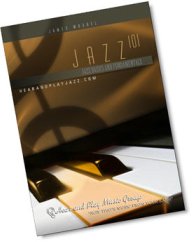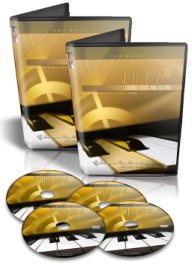Piano Adventures
by Nancy and Randall Faber
Levels 1 through 5
If you have ever played the piano for a few months, or even years, and been totally frustrated because you couldn't figure it out, still didn't know the notes and thought, "what the heck hand position am I in?", then you should start using this wonderful, innovative series:
Faber Piano Adventures
The approach to reading music stresses and incorporates the skills of
- note recognition on the staff
- reading and recognizing intervals
- relating the actual keys on the piano to the notes on the staff
With this approach, notes in Middle C position and C Position are used; however they are played with various different fingerings.
For example, we might play Middle C with finger 1, and then finger 2, and then maybe with finger 3. As we learn Treble G and then Bass F, the music requires us to play finger 3 on G, and then 5 on G. Similarly, varied fingering is used for Bass F and other notes presented.
This approach has several important benefits:
- It prevents the student from equating a particular note to a particular finger.
- It teaches the precise relationship between a note and the keyboard.
- It allows for a free and balanced drop of the arm and hand into the finger.
- It avoids the overuse of two thumbs on C.
- It reduces the student's dependence on preset hand positions.
- The notes of Middle C position include all seven tones of the major scale, allowing us to play numerous familiar melodies from the PreTime¨ Piano (primer level) and PlayTime¨ Piano (Level 1) series.
- The first note in each hand of each piece asks "3 on ___?" This requires us to identify the note name, to write it on the blank, then to set the hand according to the note and finger number given.
Thus we become self-sufficient in the
fundamental process of music reading. We will no longer wonder, "what the heck hand position am I in?"
Along with individual note reading, we learn to read by the
contour, or shape, of the music: step or skip? up or down?
Understanding and recognizing intervals promotes fluency and understanding of the melodic line.
A Supplementary Library that Motivates Practice
The PreTime¨ to BigTime¨ Piano Supplementary Library correlates with Piano Adventures¨ to provide a broad selection of music to meet each individual student's interests. With styles that include Popular, Rock 'n Roll, Classics, Jazz & Blues, Ragtime & Marches, Children's Songs, Favorites, Hymns, and More Popular, we can choose the style that motivates us. PreTime¨ to BigTime¨ offers the right fit between interest and repertoire.
Levels 1 through 5
Faber Bio
"Nancy and Randall Faber have combined their backgrounds as composer and performer to become leading supporters of piano teachers and students. The husband and wife team has authored over 200 publications, including the bestselling Piano Adventures® method and the PreTime® to BigTime® Piano Supplementary Library.
Nancy Faber was named “Distinguished Composer of the Year” by the Music Teachers National Association for her award-winning composition Tennessee Suite for Piano and String Quartet. Her flute quartet Voices from Between Worlds was the winning composition for the National Flute Association’s Professional Chamber Music Competition. Her most recent commission was Curiouser and Curiouser for Clarinet, Saxophone, and Piano, commissioned by MTNA for the 2011 National Convention in celebration of its Year of Collaborative Music. Nancy’s music has been heard on network television and public radio. Teachers of composition include Joan Tower, William Albright, and British composer Nicholas Maw; piano studies were at the Eastman School and Michigan State University.
Randall Faber performs extensively as a classical pianist and lectures on musical artistry and talent development around the world. His performances have aired on television and public radio. He was a master teacher for the World Piano Pedagogy Conference, the Music Teachers National Association Conference, and the National Conference on Keyboard Pedagogy, and has presented as guest artist at universities throughout North America and Asia. Randall holds three degrees from the University of Michigan and a Ph.D. in education and human development from Vanderbilt University.
The Fabers advocate piano study not only for personal expression and performance success, but also as a vehicle for the student's creative and cognitive development. Their philosophy is reflected in their writing, their public appearances, and in their own teaching."
THE COMPLETE
ONLINE BUSINESS BUILDER
SBI
Hi and Welcome!
Fill out the form below to sign up for the free periodic
Player's Guide Newsletter!
Get tips and ideas about substitute chords, chord progressions and harmonic movement.
Harmony and Theory:
by Carl Schroeder and Keith Wyatt





